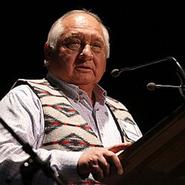
Although the Iroquois are known for many things, one particular source of pride is their history of oral tradition. On April 19 members of the Hamilton community experienced storytelling and political commentary from Bear Clan elder and leader of the Mohawk Community of Kanatsiohareke, Tom Porter, or Sakokwenionkwas -- “The One Who Wins.”
As a professional orator, Porter immediately connected with the audience, simultaneously evincing confidence and warmth while explaining the “Reader’s Digest” history of the Iroquois people. He explained how the Six Nations’ story of creation was embedded into the numbers one through 10 “by the Creator, or the Power of Powers, who knew colonization was coming to the Iroquois, and foretold that they would forget who they are and lose their spirituality, so the Creator hid things, stories, in different places so the Iroquois can remember if they ever forget.”
Porter then explained how each of the terms for these numbers share their roots with figures and events of the creation. For example, “enska” means one, but also shares its root with the “Sky Mother,” or the being that came to earth from another planet and created all the terrestrial life on the back of an enormous sea turtle.
Porter explained how the intergenerational relations among indigenous people were severed by the residential school system, which aimed to “Kill the Indian and save the man.” In these schools, Native American children, many of whom were taken at a young age to boarding schools for ‘immersion,’ were told that “all [their] culture and stories weren’t even stories, but myths and has no credence on the reality of our todays. So the creator knew the colonization was coming and hid the knowledge in the number system.”
Although many traditional Native Americans prefer to keep their culture secluded as a means of protection and cultural adhesive, Porter told the audience: “I’m not stingy, whatever anyone’s said to me I’ll share to anybody because if you don’t share it then it’s ultimately destined for death and so I tell one person, 10 people, hundreds of people so that it will not be forgotten.”
Porter’s efforts do not seem to be in vain. He finds that “More of our young people who were taken away are finding our way back now. Oral history is so important because it cannot be erased through attempts of cultural genocide.” Native languages are also critical to understanding spirituality, Porter explained. The community he started near Fonda is committed to this cause and continues to teach language courses.
By reclaiming this land, Porter returned to his ancestral territory and was enthusiastically welcomed by the largely German, now-local, community, who remembered the help the Mohawk people offered the early settlers. Beyond aid and food, the Mohawk also gave the settlers a gift of land, including 50 acres that was returned by the German descendants when Porter founded the 400 acre community, Kanatsiohareke, in 1993.
Answering how to deal with Western influence, Porter said “Modern day stuff tempts us to go the other way. Same as us all, how do you be a real human and live life everyday? I tell my children and grandchildren, ‘Do not lose who you are, make sure you get over [to that ceremony] and help because that tradition is what your grandchildren are going to have if you do your job right. Now we are sort of on the mend, our young people are growing on our land again because our grandparents were stubborn and sowed the seeds of our culture so we reap the benefits today.”
Posted April 20, 2016
